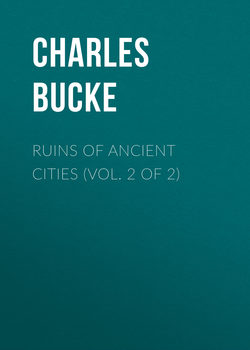Читать книгу Ruins of Ancient Cities (Vol. 2 of 2) - Charles Bucke - Страница 7
NO. VII. – NUMANTIA
ОглавлениеThis city stood near the river Douro; out of the ruins of which has arisen the town of Soria. According to Strabo, it was the capital of Celtiberia.
Strong by nature and art, and by the number of its inhabitants, it was built upon a hill, difficult of access, and on three sides surrounded by mountains. Its extent was, also, so great, that it had within its circuit pasture for cattle. It was unprotected by walls or towers; yet it bravely maintained itself, for a considerable time, against the power of the Romans. The cruelty and injustice of the Romans during this war is justly stigmatised, as being altogether unworthy a great and powerful people. The inhabitants at first gained some advantages over the Roman forces, till Scipio Africanus was commanded to finish the war, and to destroy Numantia altogether. With an army of sixty thousand men he began the siege. He was opposed by the inhabitants with great skill and courage, though their force did not exceed four thousand men. Finding themselves, however, greatly pressed, the Numantians gave themselves up, – first to despair, and then to fury. Their provisions, too, at length began to fail; and they were constrained to feed upon the flesh of horses; then on that of their slain companions; and, lastly, they drew lots to kill and devour each other. After a multitude of misfortunes, they signified a desire to capitulate; but Scipio having demanded, that they should surrender unconditionally on the next day, the Numantians refused; and when they obtained a longer time, instead of surrendering, they retired and set fire to their houses, and destroyed themselves; so that not even one remained to grace the triumph of the conqueror. This, however, has been denied by some writers, who insist, that a number of Numantines delivered themselves into the hands of Scipio, and that fifty of them were drawn in triumph at Rome, and that the rest were sold as slaves. This occurred in the year of Rome 629.
Not a vestige remains, but a few traces at a place called Puente Gavay, a spot difficult of access37.
37
Strabo; Plutarch; Brydone; Swinburne; Jose.
